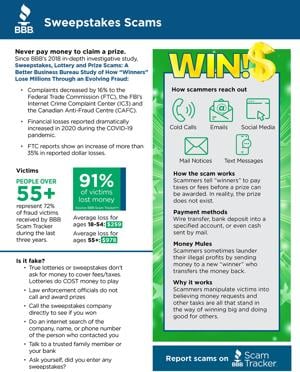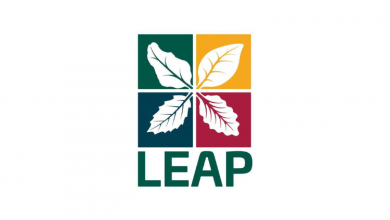How ‘winners’ lose millions through sweepstakes scams

This column has covered many different kinds of scams in the past 13 years. Among them are the grandparents scam, the jury-duty scam, the IRS scam, the gift-card scam, and the banker-impersonator scam.
Sometimes, the evolving confidence games borrow elements from each other — such as a banker-impersonator who induces people to buy thousands worth of gift cards without telling anyone — as part of “a fraud investigation.”
The very first scam this column ever broached was the sweepstakes scam, and that was back in 2012. Alas, it’s still happening both in Virginia and the United States. The Better Business Bureau says that scam has been around the longest, and that it’s gotten worse in the past four years.
Here’s how didn’t work back in 2012 on Hugh Elliott.
Then 77, Elliott received a letter at his northeast Roanoke home stamped “Royal Mail.”
It informed him he’d won $150,000 in in the “UK & North American Shoppers Sweepstakes” sponsored by The National Lottery Inc.
Elliott could not recall entering such a contest. But the scammers had that base covered, too.
“You have won this prize by shopping in one or more of the selected stores in North America: Wal-Mart, Sears, Walgreens, Kmart, Costco, Staples, Home Depot, Office Depot, etc.,” the letter read.
I think Sears and Kmart are now gone, but most Americans have visited one of those retailers at one time or another, right?
The letter also mentioned a minor hitch: British taxes needed to be paid on Elliott’s prize before he could collect. The taxes in question totaled $1,950, the letter said. Where was Elliott going to get that sum? No problem, the letter continued.
Also enclosed was a neatly typed official-looking check, made out to Elliott in the amount of $3,750. The check bore the name of a real bank based in Ohio. Oddly, the payor was a Japanese automaker that had its American headquarters in Indiana.
All Elliott had to do was deposit the $3,750 check into his own bank account, then wire $1,950 of that to the “British tax agent.” He could keep the excess for his trouble. His net, including the prize, would be slightly under $150,000.
Elliott, who made a career out of paying bills for his former employer, Norfolk-Southern Corp., didn’t fall for the scheme. But others who were less alert eventually discovered the official-looking $3,750 check was a forgery. (These days, it’s easy to conjure almost anything with a computer and a printer.)
The victims lost the $1,950 they’d wired to the “UK & North American Shoppers Sweepstakes” — which was phony.
Elliott escaped being victimized by following the Better Business Bureau’s No. 1 rule whenever dealing with any purported sweepstakes: “Never pay money to claim a prize.”
That’s worth repeating. NEVER. The BBB put it in bold, as with a headline, on a flyer it prepared to warn folks away from sweepstakes scams.
The study’s title: “Sweepstakes, Lottery, and Prize Scams: A Better Business Bureau study of how ‘winners’ lose millions through an evolving fraud.”
There are legitimate sweepstakes. One of the best known is Publisher’s Clearinghouse (if that’s still around). They send multiple pieces of mail, encouraging people to subscribe to magazines. By law, no purchase is necessary to enter that sweepstakes, though.
And your chances of winning don’t increase if you do make a purchase. The company doesn’t demand its “winners” pay taxes or other upfront fees to claim a prize.
Other kinds of sweepstakes letters arrive at American homes every day. They’re received by people of all ages. Some purport to be from well-known companies such as auto insurer GEICO. Most people throw that stuff in the trash. But a percentage don’t. Instead, they respond.
Typically, recipients are hit with a request for money, for fees, taxes, processing, whatever, to “claim” their nonexistent prize. Frequently the scammers masquerade as legitimate-sounding charities.
Sometimes they want the money wired to them, directly from your bank or Western Union. Other occasions they request victims buy gift cards in supermarkets and read the scammer the scratch-off numbers on the back. That transfers the value of the card to the scammer.
And other times scammers induce victims to put cash in an envelope and mail it directly.
According to the BBB, in sweepstakes scams, the average amount taken from victims aged 18-54 is $259. For people 55 or older, it’s $978.
“Interviews with victims show they are not overcome with greed,” the BBB report notes. “Rather, scammers encourage them to think about the nice things they can do for their families or communities with the money.
“Perhaps they want to help out a relative in financial distress, or have a grandchild who wants to go to college. For many seniors, it may be a way to increase their importance in the lives of their families.”
That last sentence is heartbreaking, because many elderly victims often recall when they raised and supported offspring — who are now adults and no longer need the support. For them, a sudden large windfall looks like a chance to reclaim the provider role.
“Most victims are over 55,” said Julie Wheeler, CEO of the Better Business Bureau of Western Virginia. “And, once you get tangled up in one, you end up on a list and are targeted by more. Some are related but some are where your name is sold as a willing victim” — to other scammers.
What happens next is letters and packages fill a trusting victim’s mailbox, promising five-figure (or greater) prizes. Then the requests for processing fees or taxes or some other justification begins.
In one case, according to the report, a scammer promised a elderly woman that she’d won $2.5 million plus a new Mercedes. The only problem was $400 in taxes needed to be paid before she could collect.
After the lady sent that money, the scammer contacted her again. He told her he was driving to her house from Chicago — in her new Mercedes — when he was stopped by police. He needed bail money, so she sent him more. Those calls continued. Ultimately she lost $4,000 before she realized she was being taken.
Wheeler said there’s a very simple bottom line with sweepstakes scams: “You do not pay money to win. If you are paying money to enter, it’s not legitimate,” Wheeler said.
From 2015-17, law enforcement authorities in the United States and Canada reported 500,000 sweepstakes scam complaints from victims, according to the BBB. Total losses in 2017 alone totaled $117 million.
The true scale of the fraud is likely far higher, the BBB warns in the report. That’s because “victims rarely complain about this type of fraud. Victims often send $20-$30 each time, over months, and individual losses can mount into the tens of thousands of dollars.”
The U.S. Federal Trade Commission “found after bringing suit that only one victim in 1,000 had ever filed a complaint. Moreover, many caregivers or local police do not necessarily understand this fraud, and they may not provide help to repeat victims or assist them in reporting to BBB or law enforcement,” the report warned.
That’s why you’re reading about it in this column today. It’s a warning, to help you keep your hard-earned money. Don’t give any away to letters promising riches, or to a voice on the other end of the phone.
The perpetrators are evil, and they’re organized. They have black hearts. They’ve figured out a process to squeeze money out of good-natured and well-meaning people. And behind the scenes, they celebrate their scamming acumen, high-fiving each other with every new mark.
So if you see the word “sweepstakes” on a mailer delivered by the U.S. Postal Service, throw it away. Don’t fall prey to their tricks!




